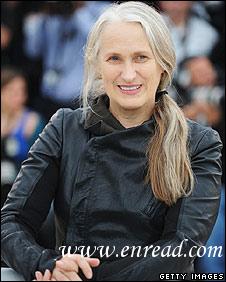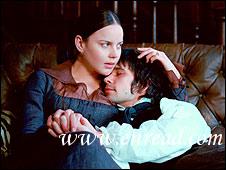| ||||||||||||||||||||||||||||||||||||||||||||||||||||||||||||||||||||||||
|
New Zealand director Jane Campion has urged female film-makers to "put on their coats of armour1" and make an impact on the Cannes Film Festival. 新西兰导演Jane Campion建议女电影制作人“穿上她们的护甲”,在戛纳电影节上有所作为。 Jane Campion is the only woman film-maker to win the Palme D'Or "I would love to see more women directors because they represent half the population - and gave birth to the whole world!" jokes director Campion, in competition at Cannes with the period romance Bright Star. "What interests women is very interesting to me and without more women writers and directors, the rest of us are never going to learn the whole story. "But I think women grow up without a lot of harsh criticism, they are treated more sensitively and it's quite hard when you first encounter the world of film-making." She says women can find it difficult to "develop a tough skin". "But women must put on their coats of armour and get going, because we want to see more of them in the competition," adds the New Zealander, who is in competition at the festival 16 years after she was the joint2 winner of the Palme D'Or for The Piano. "Last night when we checked the print, I got butterflies," says Campion about her return to the Croisette. "I felt excited and fearful." Campion, 55, exudes3(流出,渗出) warmth and humility4 as she talks about Bright Star: "I so loved the adventure, I feel sad to be moving away from it." Her first feature film in six years, it follows the intense love affair between the penniless poet John Keats and his outspoken5 neighbour, the beautiful Fanny Brawne. "I felt like I had entered another planet," says Campion, who stumbled(绊倒,失策) upon Keats and Fanny's story when she read Andrew Motion's biography of the poet. "The history of their relationship caught me unaware6. It was so exciting, so painful." Bright Star chronicles a passionate7 love affair 'Intimate story' The story is told though Fanny's eyes: "Fanny falls in love with Keats, and that way we fall in love with Keats with her. "She wasn't that keen on poetry, but through the story she gained an appetite and a love of poetry. So for me, she was a very honest person to travel with, as I felt in a very similar position." She insists the film was not intended as either a biopic(传记片) or a period piece, despite the Regency dress and genteel(文雅的,有教养的) recreation of an unrecognisable Hampstead village. "It was important to me to tell a very intimate story... not to focus on the grand houses and the costumes," says Campion. She urged her leading actors, Abbie Cornish and Ben Whishaw, to find "a quality of everydayness(平淡无奇)" in their portrayal8. Campion cites her daughter as her inspiration for Fanny's modern voice, and also the reason for the long gaps between her feature films: "Alice is my reason and she is also my best film yet." Whether a film which takes a 19th Century poet and his works as its central tenet(教义,信条) can survive in the multiplexes remains9 to be seen. "We would love to think that we can bring people back to poetry - because it's such a beautiful way to plant a garden in your soul and mind." 点击  收听单词发音 收听单词发音
|
||||||||||||||||||||||||||||||||||||||||||||||||||||||||||||||||||||||||
- 发表评论
-
- 最新评论 进入详细评论页>>





